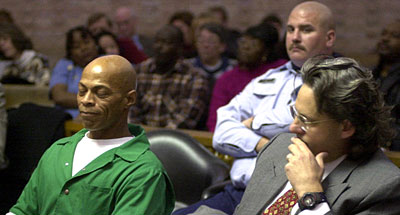Cornell Death Penalty Project's work on death-row case pays off
By Owen Lubozynski

After 31 years behind bars -- 29 of them on death row -- Edward Lee Elmore walked out of prison March 3, thanks in part to efforts of the Cornell Death Penalty Project.
Elmore was convicted in 1982 for the sexual assault and murder of Dorothy Edwards in Greenwood, S.C. During the lengthy appeal process, "the state's case began to unravel," says John H. Blume, Cornell professor of law and director of the Cornell Death Penalty Project and of the Clinical, Advocacy and Skills Programs. Blume argued Elmore's third direct appeal in 1987 and has been involved in the case ever since.
"The primary attack was on the reliability of the physical evidence," he says. Once Elmore's legal team was able to enlist forensic experts, it encountered increasingly strong indications that damning evidence had been fabricated or over-interpreted by authorities. In one instance, an evidence bag went missing for years; when it resurfaced, it was found to contain a pubic hair that was not Elmore's. Nevertheless, a South Carolina judge ruled against Elmore in 2000 saying that "one hair was not enough."
Blume formed the Cornell Death Penalty Project in 1993, when he came to Cornell, in conjunction with Cornell Law Professors Stephen Garvey and Sheri Lynn Johnson, to foster empirical scholarship on the death penalty, offer students an opportunity to work on death penalty cases, and provide information and assistance for death penalty lawyers. Students subsequently got involved in Elmore's case, performing research, conducting interviews and drafting claims periodically over the next decades of litigation.

In 2010, with Blume as lead counsel, clinic students assisted in an Atkins hearing (in Atkins v. Virginia in 2002, the U.S. Supreme Court ruled that imposing the death penalty on the mentally retarded constitutes cruel and unusual punishment). The state judge ruled that Elmore was mentally retarded and thus not eligible for execution. The judge commuted Elmore's death sentence to life imprisonment and the state chose not to appeal.
In late 2011, however, the U.S. Court of Appeals for the 4th Circuit, which Blume notes is among the most conservative federal courts of appeal in the country, voided Elmore's convictions, ruling that his trial counsel provided constitutionally ineffective assistance during the guilt phase of Elmore's capital trial. Elmore then accepted an offer from prosecutors in which he maintains his innocence, and in exchange for his immediate release, his sentence was commuted to time served.
"I think it is a happy but bittersweet ending to a long fight," says Blume, "I am 100 percent convinced he is not guilty and that a jury would have acquitted him, but I can totally understand that he just wanted out and wanted this behind him."
Blume described the case as a "lesson in the power of persistence."
Owen Lubozynski is a freelance writer.
Media Contact
Get Cornell news delivered right to your inbox.
Subscribe